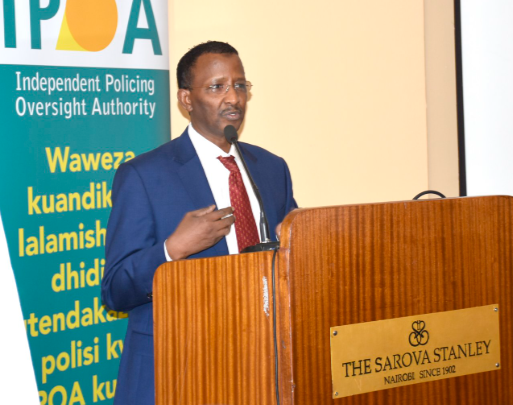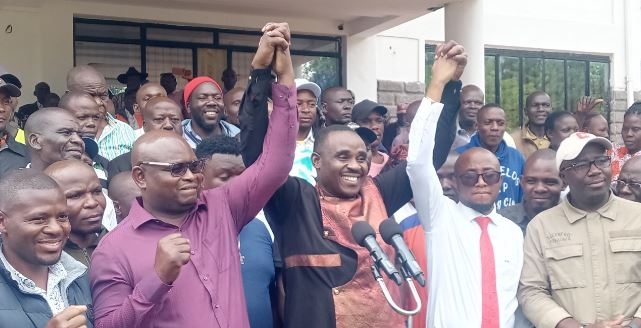

Though most Kenyans want killer cops brought to book, refusal by police to cooperate and a tiff between watchdog Ipoa and ODPP is undermining the efforts, it has emerged.
Independent Police Oversight Authority boss Issack Hassan laid bare the difficulties the agency is facing in holding rogue police officers accountable, complaining that police have perfected stone walling, blocking it from accessing key resources to complete its investigation.
He said during the launch of the Missing Voices report at ICJ Kenya offices on Wednesday that the police have completely refused to cooperate with its investigations.
He said that Ipoa officers are denied access to firearm register, deployment details, order documents and accused officers sometimes refuse to honor summons to be interrogated.
“It is a case of lack of or outright non-cooperation by the police,” he said.
Hassan also lamented that his investigators are completely overwhelmed because they are just below 80 against a staff establishment of over 700.
Hassan also complained that the office of the director of public prosecution has not been proactive in handling the files Ipoa send to his desk.
For example, he said, out of the 60 files arising from the gen Z protests that Ipoa has handled, it has completed 22 and forwarded to the ODPP but a number of them have been returned for this or that.
“We have so far opened 60 files and completed probe on 22 and sent them to the ODPP. A number of them have been returned for various reasons,” he said.
Missing Voices a coalition of human rights agencies campaigning against extrajudicial killings and enforced disappearances.
The report show that there were incidents of 104 extrajudicial killings in 2024, a 12 per cent decline from 118 recorded in the previous year.
But enforced disappearance is show to be taking root as the police’s preferable tool of use against their targets as it leaves no traces that Ipoa can follow.
The disappearances are shown to have risen 450 per cent over the period. 55 incidents were recorded from only 10 in the previous year.
The agencies include Haki Africa, Defenders Coalition, IJM, IMLU, ICJ Kenya and Kenya Human Rights Commission among others.
LSK president Fath Odhiambo, on her part, said the law should be amended to have police officers implicated in abuse of power step down from policing duties as they face the law.
“These officers still got to police stations, access records, arms and interfere with investigation. Even public officers step down once they are charged with criminal cases. We demand that police officers implicated step down,” she said.
The lobbies, in a statement read by IJM Kenya country director Vincent Chahale said that despite the high number of enforced disappearances over the last one year, no officer has been taken to court and charged with the crimes.
“The challenges of investigating and prosecuting cases emanating from protests have necessitated the doctrine of command responsibility, which Missing Voices partners are pursuing in the Baby Pendo case,” they said.
“We are concerned that the DPP dropped charges against 8 senior commanders who had been lined up for prosecution. Even more worrying was the move by the DPP to expose witnesses in the charge sheet, endangering their lives,” they added.
It is worrisome that the majority of cases forwarded to ODPP arising from protests have either been returned for further investigation or closed, making it difficult to hold police officers to account for public order management violations, the entities said.
They now demand that the National Police Services undertakes intense radical reforms that will ensure non-reoccurence of the violent policing seen in 2024.
Also, that IPOA and ODPP urgently acts on cases touching on command responsibility to address deaths during protests.
They want parliament to allocate funds to the Victim Protection Fund to adequately cater for reparations for all victims and families of extrajudicial killings and enforced disappearances.
“The State [should] fulfil its commitment to ratify the International Convention for the Protection of all Persons from Enforced Disappearances that Kenya signed in 2007, and for Parliament to enact legislation to specifically criminalise enforced disappearances under domestic law,” they said.
Also, the executive needs to implement the National Coroner’s Service Act and establish the National Coroners Service to support independent investigations into all deaths.
They also want the NPS to enhance community policing to bridge the trust gap between the public and security agencies.
Instant analysis
A culture of impunity persists in Kenya’s police force, shielded by systemic resistance and institutional dysfunction. Without urgent reform and cooperation between oversight bodies, justice for victims will remain elusive.













